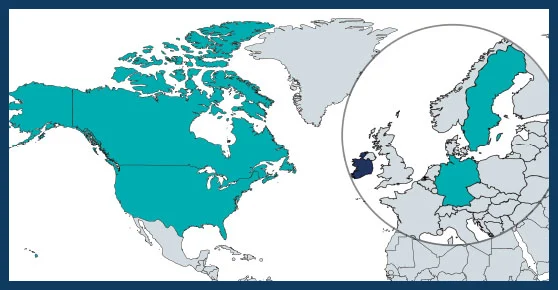11-2018 to 04-2022
€ 1,390,602
Tasman Crowe
tasman.crowe@ucd.ie
University College Dublin, IRELAND
Trinity College Dublin, IRELAND
Université Laval, Quebec, CANADA
Helmholz Zentrum, Geesthacht, GERMANY
University of Duisberg-Essen, Essen, GERMANY
University of Gothenburg, SWEDEN
Colorado State University, Fort Collins, USA

Environmental policy and management to regulate multiple human activities require detailed understanding of how activities act individually and in combination to affect ecosystems and the range of services they provide. Progress has been made in characterising effects of many anthropogenic pressures on biodiversity, consequences for ecosystems and links to services. However research must be extended to capture effects in multiple dimensions of biodiversity and determine how changes in one ecosystem affect others.
• develop an integrative framework of coupled models for predicting the immediate and long term consequences of land-use and climate change for the delivery of ecosystem services and the underlying biodiversity and ecosystem processes in freshwater and marine ecosystems;
• co-design a mechanism for the application of the framework to environmental policy & practice.
The project will focus on combined impacts on freshwater and marine systems of selected human inputs to terrestrial systems (nutrients, biocides) and future climate-induced changes to hydromorphology. Empirical research will characterise combined effects of these stressors on multiple dimensions of biodiversity and on ecosystem processes, services and benefits. Findings will fill gaps in existing knowledge, which will be reviewed and complemented by expert opinion as a basis for a framework of coupled models (physical, biological and socio-economic) to predict impacts on aquatic ecosystems and ecosystem services. The frame-work and its application to policy and management will be developed and trialed for four case study catchments: Dublin Bay (Ireland), the St Lawrence Estuary (Canada), Bohuslän (Sweden) and the German part of the Wadden Sea.
Land2Sea will use online communication to inform, solicit participation of and engage stakeholders. Data and outputs will be accessible via platforms such as OPPLA, BISE and the OGSL. Land2Sea will engage differentially with its specific target groups. Workshops and other face to face interactions with stakeholders will be a key to engaging local stakeholders and communities. There will also be workshops with environmental decision-makers and planners. A Stakeholder Advisory Group will fine tune the work programme, ensure that the results will meet the needs of end-users and help with dissemination.